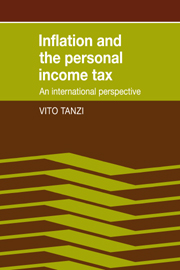Book contents
- Frontmatter
- Contents
- Preface
- 1 Inflation and personal income taxation: an introduction to the main issues
- 2 Inflation and the real progression of the rates: problems and solutions
- 3 Inflation and the real progression of the rates: countries' experiences
- 4 Inflation and the taxation of capital gains: problems and solutions
- 5 Inflation and the taxation of interest income: problems and solutions
- 6 Inflation and the taxation of business incomes
- 7 Inflation, lags in collection, and the real value of income tax revenue
- 8 Sensitivity of personal income tax yield to income changes: theory and measurement
- 9 Indexing the personal income tax for inflation and real growth
- 10 Inflation, income taxes, and the equilibrium rate of interest: theory
- 11 Inflation, income taxes, and interest rates: some empirical results
- 12 Inflation, indexation, and the wage-tax spiral
- 13 Some general conclusions on indexation
- Notes
- Index
1 - Inflation and personal income taxation: an introduction to the main issues
Published online by Cambridge University Press: 07 October 2011
- Frontmatter
- Contents
- Preface
- 1 Inflation and personal income taxation: an introduction to the main issues
- 2 Inflation and the real progression of the rates: problems and solutions
- 3 Inflation and the real progression of the rates: countries' experiences
- 4 Inflation and the taxation of capital gains: problems and solutions
- 5 Inflation and the taxation of interest income: problems and solutions
- 6 Inflation and the taxation of business incomes
- 7 Inflation, lags in collection, and the real value of income tax revenue
- 8 Sensitivity of personal income tax yield to income changes: theory and measurement
- 9 Indexing the personal income tax for inflation and real growth
- 10 Inflation, income taxes, and the equilibrium rate of interest: theory
- 11 Inflation, income taxes, and interest rates: some empirical results
- 12 Inflation, indexation, and the wage-tax spiral
- 13 Some general conclusions on indexation
- Notes
- Index
Summary
Inflation affects individuals in myriad ways: as consumers, wage earners, savers, asset holders, borrowers, lenders, taxpayers, and so forth. This book will not deal with all of these effects but it will, instead, concentrate on the relationship between inflation and personal income taxes. That taxes and prices are somehow related has, of course, been known for a long time. In 1945, Colin Clark caused quite a stir with his controversial thesis that a high level of taxation sets in motion forces of an economic, political, and psychological nature that inevitably lead a country toward inflation. Clark's thesis sounded plausible in 1945, a year of high (for that time) taxes and inflation. But then, with the end of the war, inflation became a problem of the past and interest in Clark's thesis eventually subsided. That thesis, and much of the public-finance textbooks' discussion of tax shifting, dealt with the effects of taxes on prices. Today, however, inflation is no longer seen as a temporary aberration or as a disease of a few irresponsible countries, but, rather, it has become a more or less permanent condition in a universal context. As a consequence, it was inevitable that there should be a growing interest in the reverse of the abovementioned relationship. The focus of interest now is less on the effect of taxes on prices than on the effect of changes in price levels on tax systems.
- Type
- Chapter
- Information
- Inflation and the Personal Income TaxAn International Perspective, pp. 1 - 12Publisher: Cambridge University PressPrint publication year: 1980



